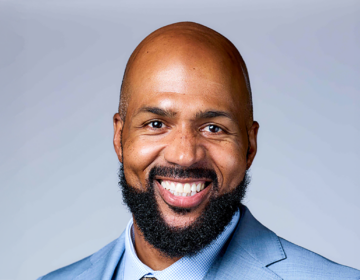Waiting on Harrisburg, Philly Schools adopt ‘placeholder’ budget
ListenBy unanimous vote, the Philadelphia School Reform Commission passed a budget Monday night that includes a $93 million placeholder for money that it hopes comes through if a political logjam in Harrisburg breaks.
Short of that, district leaders say they’d have to choose between laying off 1,300 employees, or shortening the school year.
What once had seemed a far-fetched idea on the fringes – cutting the Philly school year short of the state-mandated 180 days – is now being discussed openly by Superintendent William Hite.
Hite acknowledged that would be a major burden on families, but, he said, the alternative could be worse.
“I think 40 students in a class is unrealistic and not responsible,” he said. “And I think that as we think about the elimination of 1,300 more individuals, I’m not so sure that will leave our schools with the resources they need to ensure safety and security.”
The move would also prove costly to the district’s employees, who stand to lose salary for time away from the job.
Hite said it was in the district’s fiscal interest to avoid announcing layoffs until absolutely necessary.
“Layoffs in and of themselves cost a lot of money,” he said. “So that could mean millions of dollars that we would be on the hook for if we have to lay individuals off and then recall those individuals.”
The district can still avoid the bulk of these cuts if lawmakers in Harrisburg find a way to agree on a few key issues, chiefly, allowing Philadelphia to create a new $2 per pack tax on cigarettes sold within city limits.
House Republicans have said that Democrats must approve pension reform for state employees before they give the go-ahead to the Philadelphia cigarette tax.
On Sunday, Gov. Tom Corbett held a press conference doubling-down on that plan.
At Monday’s meeting, SRC Chair Bill Green blamed both sides of the political aisle.
“We’re standing in the middle of a battlefield with both side taking shots and the only people getting injured are the children and the families of the city of Philadelphia,” said Green, “and it’s just not acceptable for us to be in this position every single year.”
In passing a placeholder budget, the district is holding out hope that the state will coming through with some or all of the $93 million needed to continue next year at the same “bare bones” level district schools had this year.
“We’re really punting on our difficult decisions tonight in passing a placeholder budget,” said Green.
The district’s budget included $15 million dollars in internal savings and reductions, including $6.2 million in lower debt service payments and $5.5 million in special-education savings that the district says will not result in fewer services.
The SRC’s action aligned with Philadelphia Mayor Michael Nutter’s call to the SRC to refuse to adopt a budget with layoffs.
“Philadelphia’s children are not chattel to be bought and sold on the political auction block,” Nutter said in a telephone interview from Harrisburg. “If we are not successful in getting the cigarette tax authorization for a tax that was approved 16 to nothing by Philadelphia City Council, that is not asking for one dime from the Commonwealth of Pennsylvania, then I cannot reccomend to Dr. Hite that schools open at the normal time in September.”
The district has also been hoping to achieve $95 million in savings by renegotiating its contract with the Philadelphia Federation of Teachers. The PFT Contract expired August 2013.
Compromise?
Earlier Monday, Hite and Green sent a letter to Philadelphia lawmakers in Harrisburg pleading for them to compromise.
Green reiterated that notion at the meeting.
“House Republicans are insisting on pension reform as a condition of needed revenues. Democrats are stonewalling on pension reform and putting the interests of future state employees ahead of our children,” said Green. “I think by standing on principle, both sides are are avoiding making the hard, responsible choices that elected office demands.”
Rep. Cherelle Parker, D-Philadelphia, chair of the city delegation, bristled at the request.
“The SRC had the unmitigated gall to send a letter to the Philadelphia delegation in the House…when in fact they should have been sending that letter to…the governor,” she said in a telephone interview.
“We will not allow the governor to force us to make a bad public policy decision,” she said. “He will not force us to embrace the quid-pro-quo he’s offering.”
The Corbett administration says its pension plan will, in the long-run, help the state’s woefully underfunded pension accounts. The plan would move newly hired state employees, including teachers, to a hybrid of traditional pension and a defined contribution 401(k) style plan.
With majorities in both the House and Senate, Republicans, if united, could pass pension reform without support from any Democrats. But some Republicans representing heavily unionized districts reject Corbett’s pension plan.
State Sen. Vincent Hughes, D-Philadelphia, says that’s very telling.
“If it’s that important, then he should get the votes out of his Republican majority in the House and his Republican majority in the Senate,” he said. “They will tell you that they don’t want to do this either.”
In an amendment separate from the overall budget bill, the Senate preliminarily approved the Philadelphia cigarette tax Monday night.
That plan is expected to face a final vote Tuesday, before going back to the House.
Steve Miskin, spokesman for House Republicans, reiterated that the cigarette tax was dead on arrival.
Ready to learn
Late Monday night, the House and Senate approved a budget plan that included an additional $12 million for Philadelphia schools through Corbett’s Ready to Learn block grant. In February, Corbett proposed $29 million in Ready to Learn money for Philadelphia. As passed by the legislature, this would reduce the school district’s deficit to $81 million.
Corbett, though, said in a statement that he would not sign the budget.
“It does not address all the difficult choices that still need to be made,” he said. “It leaves pensions, one of the largest expenses to the commonwealth and our school districts, on the table, leaving the weight on Pennsylvania taxpayers and perpetuating the tug of war over state funding every single year.”
Corbett says pension costs consume more than 60 cents of every new dollar of the state’s general fund revenues.
“I am withholding signing the budget passed by the General Assembly while I deliberate its impact on the people of Pennsylvania.”
WHYY’s Dave Davies contributed to this report.
WHYY is your source for fact-based, in-depth journalism and information. As a nonprofit organization, we rely on financial support from readers like you. Please give today.





